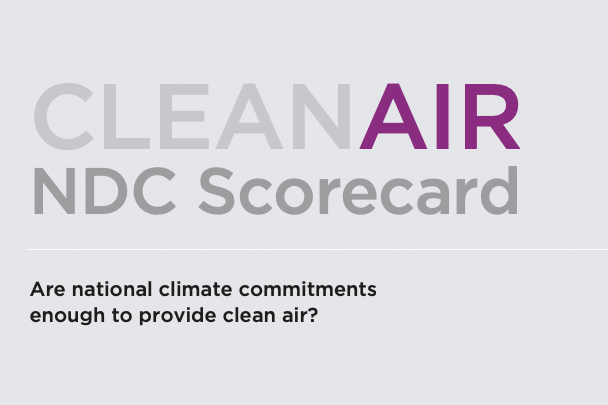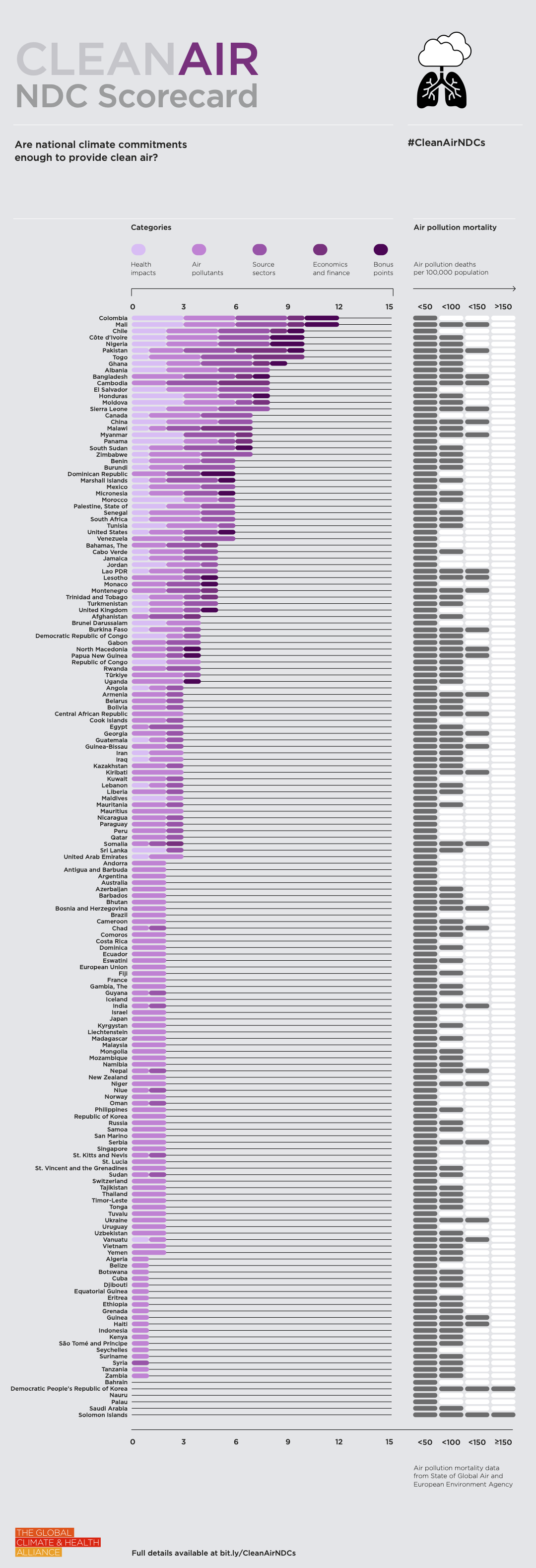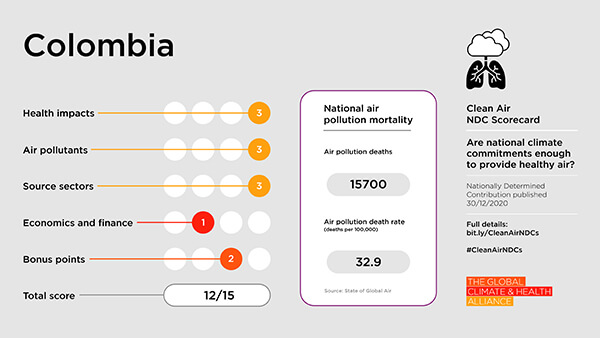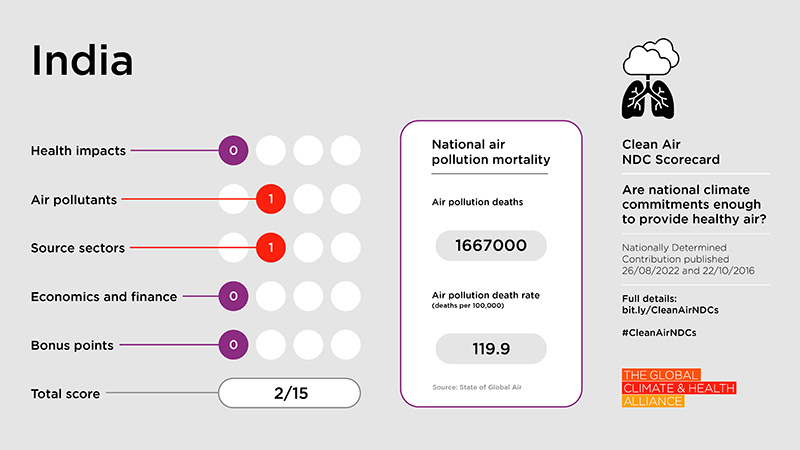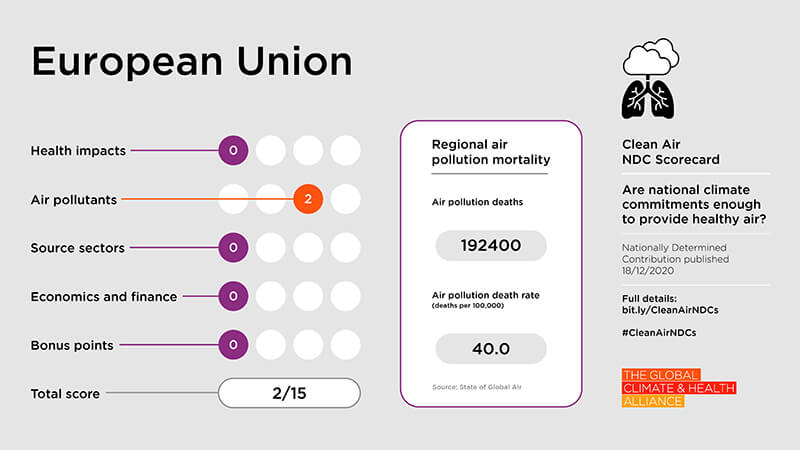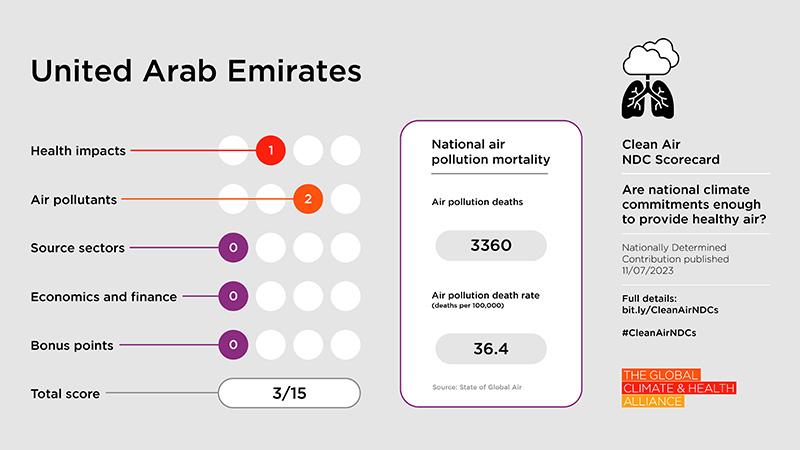Low and middle income countries lead way by taking action to improve air quality in national climate plans
- Visit the Clean Air NDC Scorecard Website
- Download the Clean Air NDC Scorecard (PDF)
- Download Clean Air NDC Scorecard report (unformatted PDF)
- Download graphics: individual country cards (png)
- Download Clean Air NDC Scorecard Country Details (Google doc)
London, 18 October 2023:- With 99% of the world’s population breathing polluted air – in excess of WHO guideline limits, a new scorecard shows how the world’s biggest carbon-emitting economies are failing their citizens by not integrating air quality into national climate plans, while countries suffering the worst impacts of air pollution are taking the most action [1].
The Clean Air NDC Scorecard, published today by the Global Climate and Health Alliance reveals how the world’s largest economies – the G20 countries – still fall short when it comes to integrating clean air and climate action, while low- and middle income countries – which suffer from the highest exposure to air pollution – demonstrate far more attention and ambition, with Colombia and Mali emerging as joint global leaders on the issue.
View large: Clean Air NDC Scorecard 2023
The scorecard reveals how countries integrate air quality considerations into their national climate plans to deliver the Paris Agreement and examines whether countries recognise the health impacts of air pollution, or if they prioritise action to improve air quality.
Countries from the global south lead the way in terms of reflecting air quality in their national climate plans with all but one of the 15 countries scoring at least 8/15 being low or middle income countries (Colombia and Mali, 12 points, Côte d’Ivoire, Nigeria, Pakistan and Togo with 10 points; Ghana with 9 points; and Albania, Bangladesh, Cambodia, El Salvador, Honduras, Moldova, Sierra Leone with 9 points; alongside Chile as the one high-income country in the top 15, with 10 points).
The scorecard also uncovers a glaring gap between the health burden of air pollution in many countries, and recognition and action on the issue in climate plans – a missed opportunity for people and economies. Out of the 170 commitments assessed in the scorecard, less than a third refer to health impacts of air pollution. Some of the biggest greenhouse gas emitters like India, Indonesia, Saudi Arabia and Australia had little or no mention of air pollution in their climate plans. Globally, seven million premature deaths occur every year due to air pollution, while recent work by The Guardian found that “almost everyone in Europe is breathing toxic air”, causing more than 400,000 deaths every year [1].
Among the G20 countries, Canada and China lead the way in integrating air quality in their national climate plans. The lowest scorers are Australia, Brazil, the European Union, and India, and also COP28 hosts the United Arab Emirates. Indonesia and Saudi Arabia are lowest on the scorecard with one and zero points respectively.
“The Clean Air NDC Scorecard confirms the human cost of delaying the inevitable phase-out of fossil fuels”, said Jess Beagley, Policy Lead at the Global Climate and Health Alliance. “As major global polluters, it is crucial for G20 countries to embed air quality considerations into their NDC, yet no G20 government even scores half marks – indicative of lack of recognition of the links between climate and air quality, or ambition to take action”, said Beagley. “It is also telling that the countries seeking to take the greatest action on air pollution are often those bearing the brunt of the impacts”.
“However, responding to the scorecard isn’t merely about trying to improve a country’s ranking, it’s about how we both imagine and seize upon the opportunity of delivering a future where the health impact of burning fossil fuels no longer exists”, she added. “Not only are fossil fuels the leading driver of climate change, they also cause millions of deaths from air pollution every year [2].
Finance Needed
“In several countries with higher scores, including Mali, Cambodia, Pakistan and China, high levels of air pollution mortality exist. Increased finance could enable these countries to accelerate implementation of actions they have identified. Meanwhile, higher income countries, including G20 members, which must provide such financial support, most often fail to recognise these links in their NDCs”, said Beagley.
The recently launched State of Global Air Quality Funding Report reveals that just 1% of all international development funding (or $17.3 billion) was expressly committed to targeting outdoor air pollution between 2015 and 2021. Only 2% of international public climate finance ($11.6 billion) went towards tackling air pollution in that same period [3]. Meanwhile, in August, the International Monetary Fund (IMF) announced that fossil fuel subsidies have risen to USD 7 trillion, while G20 countries alone spent US$1.4 trillion on fossil fuels in 2022. [4,5]. “Rather than fuelling our own destruction we need to invest in solutions which protect and promote health”, said Beagley.
COP28 and Clean Air
“Air pollution sits at the nexus of public health and climate change, yet too many countries are still failing to reap the health benefits of clean air and climate action”, said Nina Renshaw, Head of Health at the Clean Air Fund. “This means they are missing out on better air quality, which would dramatically reduce the number of people suffering from heart disease, stroke, lung cancer and asthma, which are all caused or worsened by air pollution.
“It’s encouraging to see several African countries are recognising this opportunity – but the health impacts of air pollution are conspicuously absent from many G20 countries’ climate plans. Ahead of COP28 and the first ever Health Day, we remind the host country, the United Arab Emirates, and all delegates, that the health benefits are at the heart of the case for climate action – and these can only be unlocked by taking action for clean air”, added Renshaw.
“A full stop to burning fossil fuels is essential to unlock the enormous co-benefits of clean air” said Beagley. “Protecting people’s health cannot be achieved by carbon capture technologies, which do not address toxic pollutants and particulates, such as black carbon which also accelerates warming [6,7].The vested interests of fossil fuel companies and their influence over national and international policy processes are costing lives, and must be ended”, continued Beagley.
Air quality groups – including the Global Climate and Health Alliance – have written to COP28 President Dr Al Jaber, calling on him to focus on air pollution during the climate summit [6]. However, the scorecard reveals that the UAE is not yet adequately considering air quality alongside its national climate commitments.
“This December, the COP28 president has the opportunity to put air pollution firmly on the agenda and to catalyse national commitments and international funding to improve air quality”, said Jeni Miller, Executive Director of the Global Climate and Health Alliance. “COP28’s commitment to be the first ‘health COP’ will turn out to be an empty promise if the conference does not deliver substantive progress in tackling air pollution as one of the most tangible issues at the nexus of climate and health.”
“During COP28, countries must ensure that air pollution and the co-benefits of cleaner air are recognised in the Global Stocktake, the Mitigation Work Programme, COP28 Cover Decision, and the Just Transition Work Programme. COP28 must deliver robust progress to end all fossil fuel subsidies, as a way to unlock progress across the negotiations. We must redirect these vast sums, which currently inflict enormous damage on both climate and health, to accelerate mitigation actions and a just transition aligned with the Paris Agreement, including addressing air pollution and its impacts on human health”.
View the Clean Air NDC Scorecard:
https://climateandhealthalliance.org/initiatives/clean-air-ndc-scorecard/
Contact:
Dave Walsh, Communications Advisor, Global Climate and Health Alliance, +34 691 826 764 (Europe) – [email protected] is checked regularly.
Nina Renshaw, Clean Air Fund, [email protected]
ENDS
Methodology
The Clean Air NDC Scorecard compares countries’ Nationally Determined Contributions submitted to the United Nations Framework Convention on Climate Change (UNFCCC) as required by the Paris Agreement.
169 countries, plus the European Union were assessed.
Countries were scored on five categories:
- Health impacts: Mentions of the health impacts of air pollution, any quantification of this burden, and action by the health sector to respond to these diseases.
- Air pollutants: Named air pollutants, and targets or efforts to monitor air quality.
- Source sectors: Sectors named as sources for air pollution and action within those sectors to improve air quality. Also including general reference to air pollution not covered by other categories.
- Economics and finance: Discussions of the cost of air pollution, budget for actions identified as improving air quality, or returns on investment from action to improve air quality.
- Bonus points: For mentions of WHO Air Quality Guidelines, the Climate and Clean Air Coalition or Breathe Life Campaign, the number of lives saved through improving air quality, or discussion of inequalities or vulnerabilities in exposure to air pollution, or in air pollution related outcomes.
In addition to the ‘clean air score’, with a maximum of 15 points, which is based on the written commitments made in the NDC, the scorecard also includes information on the burden of air pollution mortality in each country, enabling a comparison to be made between recognition and planned action on air quality in NDCs, and the reality of air pollution impacts on the population.
Key Findings
- Countries from the global south lead the way in terms of reflecting air quality in their national climate plans with Colombia and Mali both scoring 12 out of 15 points, and all but one of the 15 countries scoring at least 8/15 being low or middle income countries (Côte d’Ivoire, Nigeria, Pakistan and Togo with 10 points; Ghana with 9 points; and Albania, Bangladesh, Cambodia, El Salvador, Honduras, Moldova, Sierra Leone with 9 points; alongside Chile as the one high-income country in the top 15, with 10 points).
- While almost all (164 of 170) NDCs refer to air quality to some extent, less than a third of NDCs (51) refer to the health impacts of air pollution. While the majority of NDCs (119) consider at least two named air pollutants in their NDCs, only 32 refer to forward looking targets, monitoring or projections. Setting goals and monitoring air pollution is key for follow up action and accountability. Only 62 NDCs (little more than a third) identify actions to reduce air pollutant levels in specific sectors. Only 1 in 10 NDCs make any reference to air quality and financial or economic considerations.
- Globally, the average score achieved in any NDC was 3.5 out of 15 points. G20 countries which submitted an individual NDC (all except Germany and Italy) scored below average, with a mean of 3.3 points. The top ten per capita emitters (Qatar, Bahrain, Brunei Darussalam, Trinidad and Tobago, Kuwait, United Arab Emirates, Mongolia, Oman, Australia, Saudi Arabia), many of which are major fossil fuel producers, scored an average of just 2.4 points, indicative of a lack of interest in connecting fossil fuel phase out to clean air. Meanwhile, the top ten total emitters (China, United States, India, European Union, Russian Federation, Brazil, Indonesia, Japan, Iran, Saudi Arabia) scored an average of 2.7 points. The ten countries with highest rates of air pollution mortality (Democratic People’s Republic of Korea, Solomon Islands, North Macedonia, Central African Republic, Bosnia and Herzegovina, Serbia, Vanuatu, Somalia, Nepal, Myanmar) achieved an average of 2.5 points, underscoring the public health impacts of failing to recognise the links between climate action and healthy air.
- Colombia scored 12/15 with an NDC that recognises the importance of protecting health (including respiratory health specifically) through air quality action, and of monitoring these gains. Colombia also refers to multiple air pollutants, including particulate matter and nitrogen oxides, and sets a goal to achieve a reduction of 40% in black carbon. Multiple sectors are identified as sources of air pollution including agriculture, electricity generation, industry, and transport. Mali, which achieved the same score, notes that black carbon contributes to negative impacts on human health, and that PM2.5 impacts cardiovascular and respiratory systems, and plans to form a technical team to monitor short-lived climate pollutants (SLCP) on human health.
- In some countries, the burden of air pollution is high (for example in India, where there are 119.9 deaths from air pollution per 100,000 population) but detailed air quality considerations were not included in NDCs. Commitments to address air quality are first steps towards reducing air pollution. Meanwhile, in other countries, such as Nigeria, the integration of air quality considerations into NDCs is high, but the health burden of air pollution remains severe. This underscores the need to translate commitments into action. In order to achieve this, both national ambition and adequate international climate finance are essential.
Notes:
[1] World Health Organization, 2023. Air pollution. https://www.who.int/health-topics/air-pollution#tab=tab_2
The Guardian: Revealed: almost everyone in Europe is breathing toxic air
Guardian investigation finds 98% of Europeans breathing highly damaging polluted air linked to 400,000 deaths a year
https://www.theguardian.com/environment/2023/sep/20/revealed-almost-everyone-in-europe-breathing-toxic-air
[2] Lelieveld, 2019. Effects of fossil fuel and total anthropogenic emission removal on public health and climate. https://www.pnas.org/doi/10.1073/pnas.1819989116
[3] Clean Air Fund: The State of Global Air Quality Funding 2023, 28 September 2023
https://www.cleanairfund.org/resource/state-of-global-air-quality-funding-2023/
[4] International Monetary Fund, 2023. Fossil Fuel Subsidies Surged to Record $7 Trillion
https://www.imf.org/en/Blogs/Articles/2023/08/24/fossil-fuel-subsidies-surged-to-record-7-trillion?utm_medium=email&utm_source=govdelivery
[5] South China Morning Post: G20 spent record US$1.4 trillion on fossil fuels in 2022 despite climate change pledges: report
https://www.scmp.com/week-asia/health-environment/article/3232177/g20-spent-record-us14-trillion-fossil-fuels-2022-despite-climate-change-pledges-report
[6] Global Climate and Health Alliance, 2022. Cradle to grave: The health harms of fossil fuel dependence and the case for a just phase-out. Available online, accessed 21 August 2023.
https://climateandhealthalliance.org/wp-content/uploads/2022/07/Cradle-To-Grave-Fossil-Fuels-Brief.pdf
[7] McCarthy & Nadeau, 2023. Carbon capture isn’t the climate change health benefit the world needs. Available online, accessed 21 August 2023 https://www.bostonglobe.com/2023/06/01/opinion/carbon-capture-isnt-climate-change-health-benefit-world-needs/
[8] Airqualitynews.com: Air quality groups call on COP28 President Dr Al Jaber to put air pollution ‘firmly on the agenda’ https://airqualitynews.com/health/air-quality-groups-call-on-cop28-president-dr-al-jaber-to-put-air-pollution-firmly-on-the-agenda/
The letter was delivered by the Clean Air Fund on behalf of a group of organisations including Asthma + Lung UK, the Global Climate and Health Alliance, the World Heart Federation and Clean Air Asia.
About GCHA
The Global Climate and Health Alliance is the leading global convenor of more than 150 health professional and health civil society organizations addressing climate change. We are a consortium of health organizations from around the world united by a shared vision of an equitable, sustainable future, in which the health impacts of climate change are minimized, and the health co-benefits of climate change mitigation are maximised.
Find out more: https://climateandhealthalliance.org/about/

